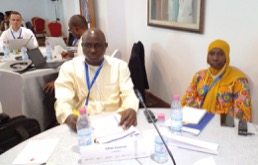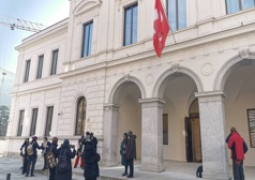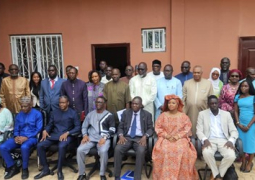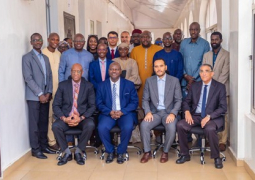
The participants including Gambians from the Higher Education ministry were invited by World Bank and partners to the august workshop.
In response to the invitation, the Ministry of Higher Education, Research, Science and Technology (MoHERST) constituted a delegation comprising Ms Fatou Janneh, Principal Tertiary and Higher Education Officer, (MoHERST), and Ousman Sillah, Chairperson of Crab Island Technical and Vocational Training Foundation (CITVETF). Their participation was fully funded by the World Bank.
The regional workshop attracted over 200 participants from different countries in Africa representing relevant ministries and agencies of government, training institutions, employers’ associations, trade unions, artisans, researchers, economists as well as development partners.
During the course of the workshop, participants discussed presentations on some key thematic areas, namely Conceptual clarifications and terminologies; Understanding apprenticeship: How informal and formal institutions interact and evolve and serve as business and skills incubators;
Potential apprenticeship skill needs in the informal economy; What works and how? Recognition of Prior Learning (RPL) and Re-conceptualising RPL for informal apprenticeships; What works and how; Digitalisation of apprenticeship; Financing and off-the-job learning; Strong associations and quality in delivery and Building knowledge for better apprenticeship systems; as well as Strategies towards a regional program on strengthening apprenticeship in the informal economy.
Research findings, as indicated, have shown that the informal economy accounts for more than 70% of the workforce and a huge percentage of GDP in most African countries albeit the sector is yet to be formalised. The argument is that the apprenticeship system in the informal economy, including the artisans, roadside mechanics, transformative, recycling technologies, to name a few, is characterized by the lack of standards and a framework to enable the promotion of quality, innovation and formality.
Ms Fatou Janneh from MoHERST moderated one of the critical group work sessions on the theme: ‘Towards a regional program on strengthening apprenticeship in the informal economy’, which drew participants from government institutions across the continent.
During this session, the participants among other things resolved to establish a Network of stakeholders from sub-Saharan African countries to advocate for and work with governments and regional and international partners to facilitate the implementation of workshop resolutions and policies towards strengthening Apprenticeship Systems in both the formal and informal economies in Africa.
In this regard, Ousman Sillah from the Republic of The Gambia was nominated by the Nigerian delegation and unanimously endorsed to serve as the Coordinator of the Network and was tasked to create a Whatsapp page and commence the process of facilitating its establishment and operation. Prof. Idris W. Buraje, the Executive Secretary of the National Board for Technical Education (NBTE) of the Federal Republic of Nigeria, was also unanimously selected to serve as Chairperson of this regional Network. The representatives of the government of the Republic of Tanzania offered to host the inaugural launch of the Network.
The high-level officials gracing the opening were four cabinet ministers of the Republic of Benin, the Director General of National Technical Education and Vocational Training of Benin (ADET), Deputy Director General and ILO Regional Director for Africa, senior World Bank officials, the representatives of the International Trade Union Congress (ITUC) Africa, French Development Agency (AFD) in Benin, among others.
In his welcoming speech, Fructueux S. Aho, Director General of ADET, said the youths need jobs to survive but cannot do this without training to acquire skills that meet the needs of the economy. He emphasised that more effective apprenticeship systems will trigger more inclusive development in Africa. He indicated that it is their role to support policy makers to evolve effective transformative systems.
The Country Director of the French Development (AFD) in Benin, Jerome Bertrand-Hardy, indicated that informal apprenticeship should factor in policy and mainstreamed in government programmes. He indicated that they have credit lines for enterprises.
In the statement of Ms. Cynthia Samuel Olunjuwon, Deputy Director General and ILO Regional Director for Africa, she noted the commitments made by governments and partners to the ILO Abidjan Declaration that supports the AU 2063 goals. She noted that the six pillars of the Declaration support the values for social justice and resonates with the objectives of the regional workshop.
On the way forward, she indicated the need to ensure the involvement of governments in the process, upgrading of apprenticeship systems, upscaling, quality assurance, partnerships, among others. She also emphasised the importance of the engagement of the organisations of workers or trade unions in the reform process.
Kouaro Yves Chabi, Minister of Secondary Technical Education and Vocational Training, the host ministry, in his statement, outlined the situation of the apprenticeship system in Benin, the training and certification process as well as the challenges and the efforts of the government to address them with support from development partners. He said the Cotonou meeting should be about experience sharing and learning about challenges to chart the way forward.
In his opening statement, the State Minister in Charge of Development and Coordination of the Governmental Action, Abdoulaye Bio-Tchane, who was represented by the Minister of Micro Finance and Social Action, said the challenge facing African countries is the demographic growth which should not be trivialized.
He said the Government of Benin saw the need to adopt a national strategy for technical and vocational education training through the creation of the Agency for the Development of Technical Education (ADET). He said the government is implementing the strategy by leveraging potentials to boost areas such as agriculture, industry, trade, etc. He noted that the craft industry is a key priority area of government.
The Cotonou workshop came up with key resolutions on strategies and policies for implementation toward strengthening apprenticeship systems by governments, training institutions, employers, artisans and workers’ organisations and other stakeholders.
Presenting the feedback from development partners, Venkatesh Sundararaman, Lead Economist World Bank, said the World Bank is ready to support and accompany countries in the process of putting in place effective apprenticeship systems.
The sessions were coordinated by Stefano Meranti, TVET/Skills Development Programme Officer, ITCILO, and with support from Christelle Kouame, Economist World Bank, and other officials from the international development partners.





